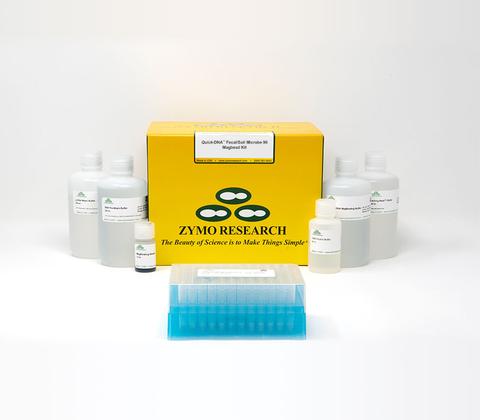
Highlights
- Rapid, high-throughput method for the isolation of inhibitor-free, PCR-quality DNA from fecal samples in minutes, including those from humans, birds, rats, mice, cattle, etc.
- Ultra-high density BashingBeads are fracture resistant and chemically inert.
- Zymo MagBinding Bead technology effectively removes PCR inhibitors from the DNA product.
Description
Technical Specifications
| Applicable For | All sensitive downstream applications such as qPCR and Next-Generation Sequencing. |
|---|---|
| Elution Volume | ≥ 37.5 µl |
| Equipment | Centrifuge fitted with a 96 well microplate carrier, 96 Well Magnetic Stand, Liquid handler or other robotic sample processor, 96 well plate heat block, 2 mL 96 well plates and reagent carriers (user supplied). |
| Purity | A260/A280 nm ≥1.8. |
| Sample Source | Feces or soil |
| Sample Storage | DNA stored at ≤ -20°C. |
| Size Range | Capable of recovering genomic DNA up to and above 40 kb. In most instances, mitochondrial DNA and viral DNA (if present) will also be recovered. |
| Type | Total DNA |
| Yield | ≤ 25 µg total DNA |
Product FAQ
Q1: Can I use more sample input by scaling up the protocol?
Custom solutions can be provided, please contact automation@zymoresearch.com.
Q2: Do you have scripts available for your automated kits and/or do you provide scripting support?
Yes, we currently have scripts for Hamilton and KingFisher, as well as support for Tecan on some systems. Our protocol includes an “automation guide” for users to script the protocol themselves and our automation support staff also provides automation troubleshooting and advice if needed.
For detailed help regarding all automation questions, please contact automation@zymoresearch.com.
Q3: Are there any tips in optimzing bead beating conditions?
We have validated our kits with both high-speed homgenizers and low-speed disruptors. We highly recommend users to optimize their bead beating conditions for their own instruments. We recommend using a 2 ml-tube adapter to ensure that the bead beating is efficent (do not use adapters made of foam). For high-speed homogenizers, we recommend a total of 5 mins bead beating (1 min interval at 6.5 m/s with 5 mins rest, repeat 5 times). For low-speed cell disruptors, we recommend 30 mins at max speed.
Q4: Is it necessary to add beta-mercaptoethanol? Can this step be substituted or omitted?
Addition of beta-mercaptoethanol is recommended to enhance sample lysis, but can be substituted with dithiothreitol (DTT, final concentration of 10 mM). However, if bead beating is optimized and lysis is efficient, the addition of BME is not necessary and can be omitted.
Q5: When can an RNase A treatment be implemented in the protocol?
No additional RNase A treatment is required when processing samples within kit capacity. The selective chemistry allows for binding of double stranded DNA to the column and for RNA to flow through.
Citations
Kit Components
| Cat # | Name | Size |
|---|---|---|
|
D3004-2-200 |
g-DNA Wash Buffer | 200 ml |
|
D3004-4-50 |
DNA Elution Buffer | 50 ml |
|
D3004-5-250 |
DNA Pre-Wash Buffer | 250 ml |
|
D4100-2-12 |
MagBinding Beads | 12 ml |
|
D4077-1-150 |
Quick-DNA MagBinding Buffer | 150 ml |
|
D6001-3-150 |
BashingBead Buffer | 150 ml |
|
S6002-96-3 |
ZR-96 BashingBead Lysis Rack | 0.5 mm & 0.1 mm |
|
S6012-50 |
ZR BashingBead Lysis Tubes (0.1 & 0.5 mm) | 50 Tubes |


